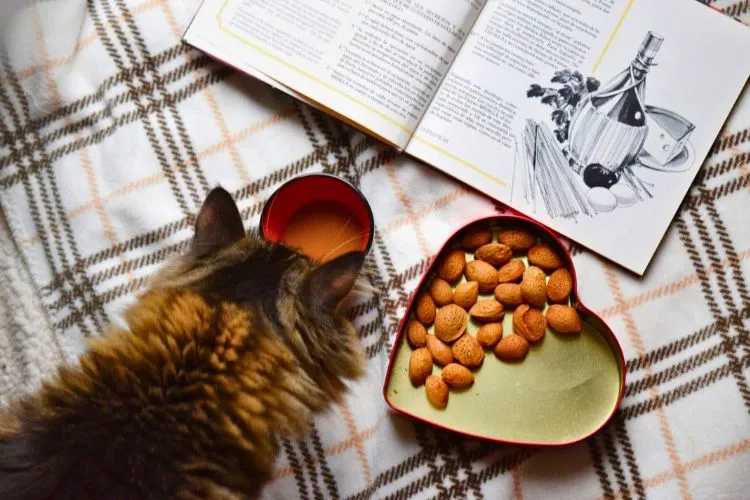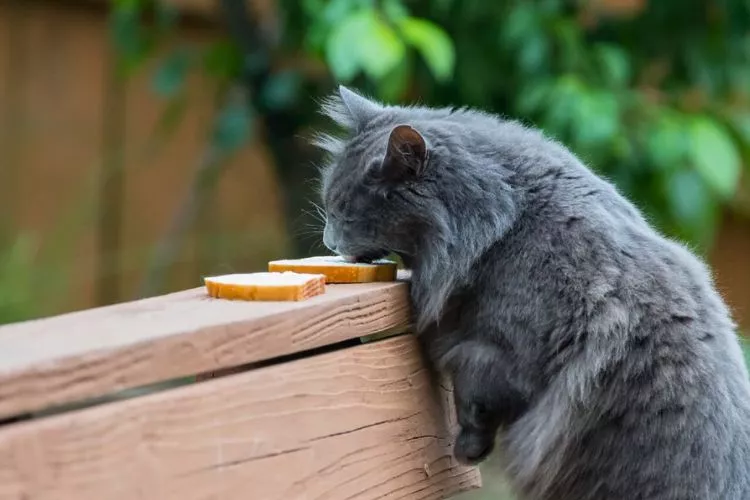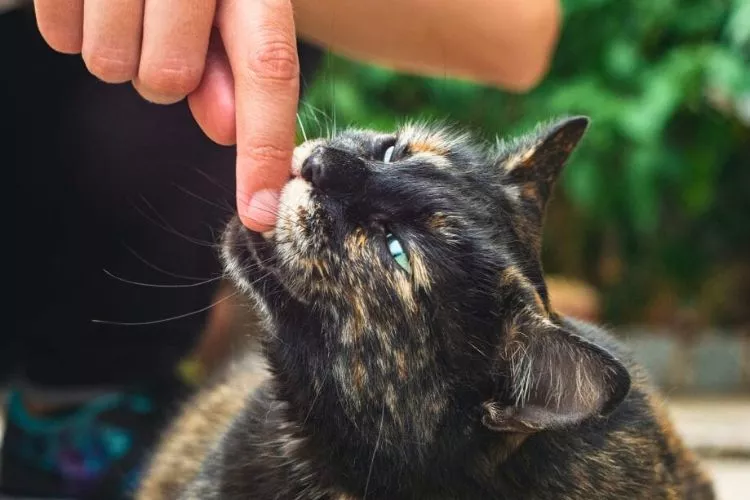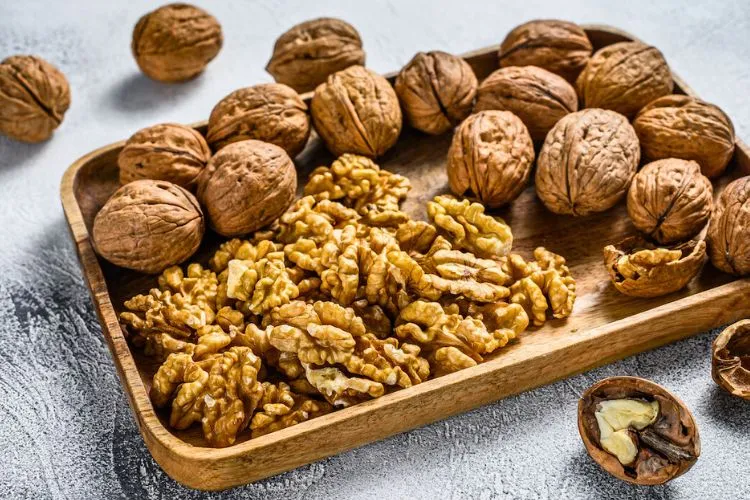As pet owners, ensuring our furry friends maintain a healthy and balanced diet is always a top priority. We know that fussy cats sometimes turn up their noses at the regular cat food we provide.
They might tend to show interest in our cherished human delicacies, such as almond butter. This intrigue sparks the question: can cats eat almond butter?
Well, you will get the answer in this article itself.

🐾 Can Cats Eat Almond Butter?
Cats should not eat almond butter as it is not recommended for their diet. Almond butter is high in fats, difficult for cats to digest, and may lead to obesity and health problems.
Furthermore, some almond butter contains xylitol, a sweetener toxic to cats. Although a tiny lick might not harm your cat, always consult your vet about introducing new foods, and stick to cat-friendly meals.
Let’s delve into the reasons why.
- Digestive system: Cats have a unique and specialized digestive system primarily designed to process meat. They are obligate carnivores, meaning they require a meat-based diet. While they can handle some other types of food, they are not equipped to process foods like almond butter efficiently.
- Potential toxins: Almonds, and by extension almond butter, contain cyanogenic glycosides. This substance can potentially lead to cyanide poisoning in cats.
- High in fat: Almond butter is also high in fats. While humans can process these fats, they can be difficult for cats to digest and may lead to obesity and other health problems such as pancreatitis.
- Xylitol: Another important consideration is that some almond butter brands use xylitol as a sweetener, which is extremely toxic to cats. Even small amounts can cause rapid insulin release, leading to hypoglycemia (low blood sugar), seizures, liver failure, and even death.
While the occasional tiny lick of almond butter might not harm your cat, it should by no means become a staple in their diet.
Always seek professional advice from your vet when introducing new foods into your cat’s meals. It’s best to keep almond butter for human consumption and stick to cat-friendly fare for your feline friend.
🐾 Can Cats Eat Nut Butters?
While nut butters like almond, peanut, and cashew butter have gained popularity among humans for their rich taste and high protein content, these spreads aren’t suited to our feline friends.
As obligate carnivores, cats have a digestive system optimized for consuming meat and struggle to process plant-based proteins efficiently.
Moreover, many nut butters are high in fat, which can lead to obesity and pancreatitis in cats if consumed in significant quantities.
They also often contain added sugars or salt, which aren’t ideal for a cat’s diet.
Some nut butter, notably ‘sugar-free’, may contain a sugar substitute called xylitol. Xylitol is extremely toxic to cats. Even in small amounts, it can cause a sudden insulin surge leading to hypoglycemia (dangerously low blood sugar), liver failure, seizures, and even death.
🐾 What Kind of Butter Can Cats Eat?
Technically, cats can eat regular (full-fat) dairy butter in small amounts, considering it doesn’t contain added salt or other preservatives.
This includes unsalted, organic butter. Cats often love the creamy taste of butter, and some owners might use it as a treat or to coax a picky eater to nibble.

However, butter cannot be a staple in a cat’s diet. It’s high in fat and doesn’t contribute any essential nutrients that cats need for healthy growth and development. Regular or excessive consumption can lead to obesity, pancreatitis, and other health problems.
Not all cats can tolerate lactose in dairy products, including butter. Some might experience digestive issues such as diarrhea or upset stomach.
When in doubt, it’s best to consult with a vet or pet nutritionist for more personalized advice about feeding butter or equivalent treats to your cat.
🐾 What is a Good Substitute for Peanut Butter for Cats?
Opting for a healthier, more cat-friendly treat to substitute peanut butter is a worthy consideration. Many companies manufacture cat treats that are both safe and palatable to cats.
Likewise, some safe human foods like plain cooked chicken, fish, or turkey can serve as a delicious and healthy treat for the occasional pampering of your furry friend. These whole meats served unseasoned are an excellent source of essential proteins and nutrients for your cat.
Further, cat-friendly spreads and pastes are available in pet stores, specifically formulated to cater to cats. For instance, malt paste, frequently used to prevent hairball formation, can be a good substitute for peanut butter.
Remember, treats should comprise no more than 10% of your cat’s daily caloric intake. Always consult your vet for dietary advice tailored to your cat’s needs, breed, and overall health condition.
🐾 Can Cats Have a Little Butter as a Treat?
Cats can occasionally have a small amount of regular (full-fat) dairy butter as a treat. Yet, it’s vital to remember that butter is high in fat and lacks the essential nutrients cats require.

Too much butter can lead to obesity and other health conditions. It is also recommended that only unsalted butter be used, as salt can harm cats in larger amounts.
🐾 Is Cashew Butter Toxic to Cats?
Cashew butter isn’t recommended for cats like most nut butters despite not being explicitly toxic. Cats are strict carnivores and don’t digest plant proteins efficiently.
Furthermore, cashew butter can be high in fats, leading to health problems like obesity and pancreatitis if consumed in excess.
🐾 Are Walnuts Poisonous to Cats?
Walnuts aren’t typically poisonous to cats, but they can pose risks due to their high-fat content and potential mold contamination. If moldy, walnuts can produce harmful mycotoxins that cause neurological issues in cats.

Given these risks and the fact cats don’t need nuts in their diet, it’s best to keep walnuts and other nuts out of your cat’s reach.Please always consult your vet for personalized advice when introducing new food items to your pet’s diet.
Conclusion :
While almond butter might be a delicious treat for humans, it’s unsuitable for our feline friends. Cats, obligate carnivores, should primarily consume meat to maintain their health.
Almond butter’s high-fat content and potential exposure to toxic sweeteners like xylitol make it an unsuitable cat treat.
Instead, focus on providing a nutritious cat-friendly diet and seek alternatives like plain cooked meats or cat-specific treats to pamper your kitty.
As always, consult with your veterinarian before introducing new foods to your cat’s meals, ensuring their health and well-being.
